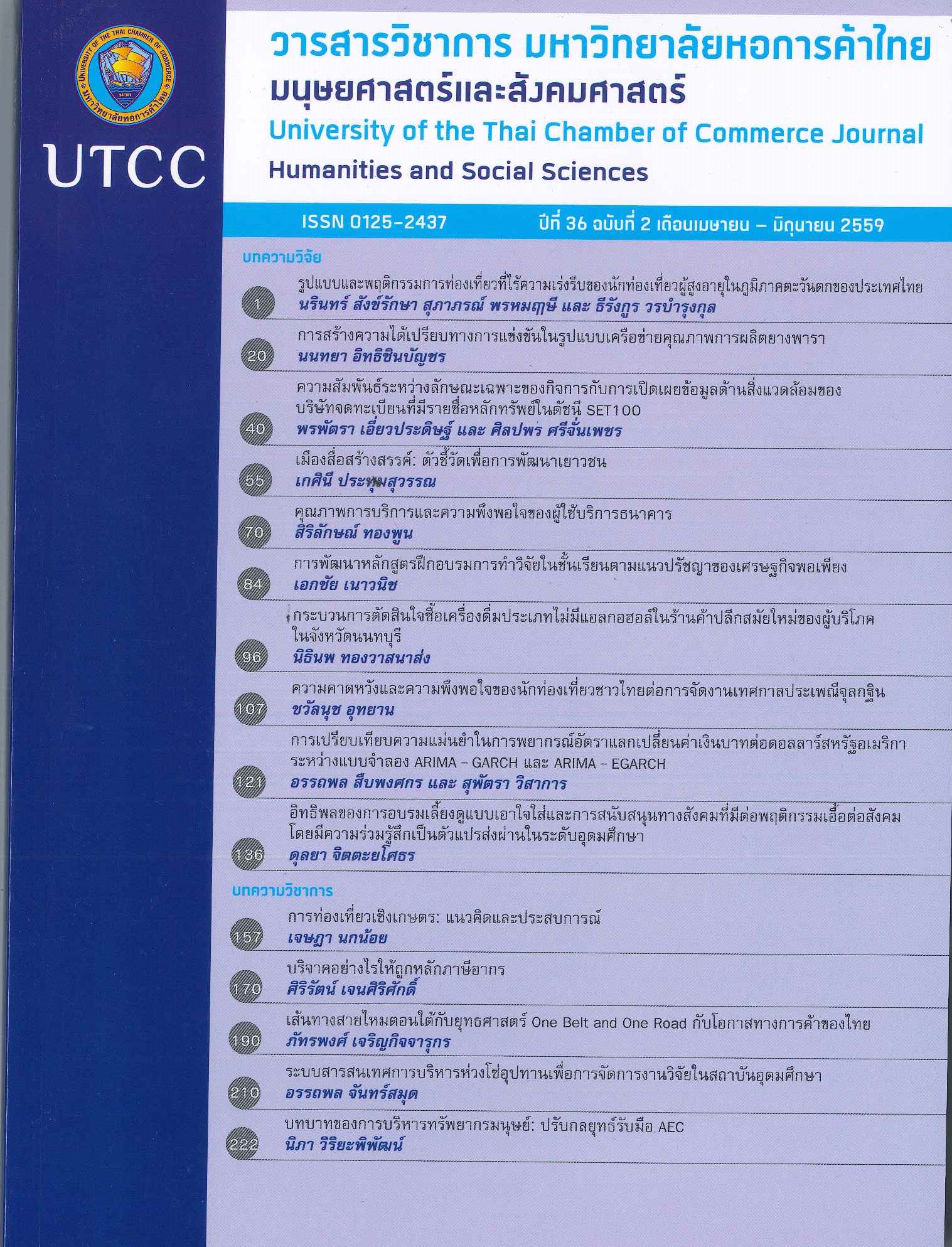The Expectation and Satisfaction of Thai Tourists toward the Jullakatin Festival
Main Article Content
Abstract
This research aims to evaluate the behavior of tourist participants in Jullakatin, a Buddhist festival celebrating the end of Buddhist Lent. This local religious festival was
held at Wat Tap Klaiy, Ban Rai Distirct, Uthai Thani. An exploratory research method was employed. Based on the literature review, the questionnaire was developed to examine socio-demographics, expectations and satisfactions. The validity and reliability of questionnaires were ensured. Results showed that the overall expectation and
satisfaction toward the Jullakatin Festival were at a mederate level. Tourist respondents were most satisfied with the facilities provided, followed by the festival activities as
well as life safety and security, respectively. The results also showed relationship between the socio-demographics and travelling behavior of tourists and their.
expectation and satisfaction. It was found from past studies that there are three main components that determine tourists’ behavior in the success of a destination
development for event tourism, including facility, tourists’ activity, and tourists’ safety.
Article Details
ลิขสิทธิ์ของบทความ
ผลงานที่ได้รับการตีพิมพ์ถือเป็นลิขสิทธิ์ของมหาวิทยาลัยหอการค้าไทย ห้ามมิให้นำเนื้อหา ทัศนะ หรือข้อคิดเห็นใด ๆ ของผลงานไปทำซ้ำ ดัดแปลง หรือเผยแพร่ ไม่ว่าทั้งหมดหรือบางส่วนโดยไม่ได้รับอนุญาตเป็นลายลักษณ์อักษรจากมหาวิทยาลัยหอการค้าไทยก่อน
References
Chanaranamchoo, Nopporn and Rattanapongpinyo, Taninrat, and Rathasatanasad, Dacha. 2014. “Developing Strategies for Cultural Tourism Relevant to the ASEAN Community Based on the Creative Economy of Four Dvaravati Provinces” University of the Thai Chamber of Commerce Journal 34, 4: 1-15. (in Thai).
นพพร จันทรนำชู, ธนินท์รัฐ รัตนพงศ์ภิญโญม และ เดชาพันธ์ รัฐศาสนศาสตร์. 2557. “การพัฒนายุทธศาสตร์การท่องเที่ยวเชิงวัฒนธรรมกลุ่มทวารวดี 4 จังหวัดตามแนวทางเศรษฐกิจสร้างสรรค์เพื่อรองรับประชาคมอาเซียน” วารสารวิชาการ มหาวิทยาลัยหอการค้าไทย 34, 4: 1-15.
Chokriensukchai, Kanchana. 2014. “ Myanmar’s Travel Behavior, Media Exposure and Perception on Thai Cultural Universals” University of the Thai Chamber of Commerce Journal 34, 4: 92-108. (in Thai).
กาญจนา โชคเหรียญสุขชัย. 2557. “พฤติกรรมการท่องเที่ยว การเปิดรับสื่อและการรับรู้วัฒนธรรมไทยที่เป็นสากลของชาวเมียนม่า” วารสารวิชาการ มหาวิทยาลัยหอการค้าไทย 34, 4: 92-108.
Cole, S. T., and Chancellor, H. C. 2009. “Examining the Festival Attributes that Impact Visitor Experience, Satisfaction and Re-visit Intention.” Journal of Vacation Marketing, 15, 4: 323-333. doi:10.1177/1356766709335831.
Dechakup, Chittinan. 2000. “Introduction to Psychology Services”. In Psychology Services Teaching Material, Chapter 1-7. pp. 1-62. 4th ed. Nonthaburi: Home Economics, Sukhothaithammathirat University. (in Thai).
จิตตินันท์ เดชะคุปต์. 2543. “ความรู้เบื้องต้นเกี่ยวกับจิตวิทยาบริการ.” ใน เอกสารการสอนชุดวิชา จิตวิทยาการบริการ, หน่วยที่ 1-7, หน้า. 1-62. พิมพ์ครั้งที่ 4 นนทบุรี: สาขาวิชาคหกรรมศาสตร์ มหาวิทยาลัยสุโขทัยธรรมาธิราช.
Fridgen, J.D. 1996. Dimensions of Tourism. Lansing, MI: Education Institute of The American Hotel Motel Association.
Getz, D. 2007. Event Studies: Theory, Research and Policy for Planned Events. Amsterdam, Netherlands: Elsevier Butterworth Heinemann.
Getz, D., 2010. “Festival Stakeholders: Exploring Relationships and Dependency Through a Four-country Comparison”. Hospitality and Tourism Research Journal 34, 4: 531-556. doi: 10.1177/1096348010370862.
Jankingthong, Korkaew. 2014. “The Infulence of Individual, Group and Organizational Behaviors on the Performance of Police Stations Regarding Their Task of Providing Public Security.” University of the Thai Chamber of Commerce Journal 34, 3: 31-41. (In Thai).
กอแก้ว จันทร์กิ่งทอง. 2557. “อิทธิพลของพฤติกรรมระดับบุคคล กลุ่ม และองค์การที่มีต่อผลการดำเนินงานของสถานีตำรวจเพื่อประชาชนในงานด้านการรักษาความปลอดภัยในชีวิต.” วารสารวิชาการ มหาวิทยาลัยหอการค้าไทย 34, 3: 31-41.
Jankingthong, Wiwat. 2013. “Structural Equation Model of Factors Affecting Thai Tourist Loyalty Towards Marine National Parks in Southern Thailand.” University of the Thai Chamber of Commerce Journal 33, 3: 1-15. (in Thai).
วิวัฒน์ จันทร์กิ่งทอง. 2556. “ตัวแบบสมการโครงสร้างของปัจจัยที่ส่งผลต่อความภักดีของนักท่องเที่ยวชาวไทยที่มีต่ออุทยานแห่งชาติทางทะเลในภาคใต้ของประเทศไทย.” วารสารวิชาการ มหาวิทยาลัยหอการค้าไทย 33, 3: 1-15.
Pattranupravat, Ruenkaew.2009. “Festivals and Rituals of Chinese Shrines in Samutsongkhram Province.” University of the Thai Chamber of Commerce Journal 29, 3: 113-138. (in Thai).
เรือนแก้ว ภัทรานุประวัติ. 2552. “เทศกาลและพิธีกรรมสำคัญของศาลเจ้าจีนในจังหวัดสมุทรสงคราม.” วารสารวิชาการ มหาวิทยาลัยหอการค้าไทย 29, 3: 113-138.
Pimonsompong, Chalongsri. 2001. Tourism Motivation. Bangkok: Kasetsart University. (in Thai).
ฉลองศรี พิมลสมพงศ์. 2544. แรงจูงใจทางการท่องเที่ยว. กรุงเทพมหานคร: มหาวิทยาลัยเกษตรศาสตร์.
Rust, Roland T, Zahorik, Anthony J, and Keiningham, Timothy L. 1996. Service Marketing. NewYork: Harper-Collins.
Seyanont, Arisara. 2010. “ Creating Value for Sustainable Tourism in the Homestay Business: Case Study of Homestay at Amphawa Floating Market Area in Samutsongkhram Province.” University of the Thai Chamber of Commerce Journal 30, 4: 77-96. (in Thai).
อริสรา เสยานนท์. 2553. “การสร้างมูลค่าการท่องเที่ยวอย่างยั่งยืนของธุรกิจโฮมสเตย์: กรณีศึกษาโฮมสเตย์บริเวณตลาดน้ำอัมพวา จังหวัดสมุทรสงคราม.” วารสารวิชาการ มหาวิทยาลัยหอการค้าไทย 30, 4 : 77-96.
Suteetorn, Busaba and Nitikasetsoontorn, Bhashavalee. 1998. Attitudes and Impression of Foreigners Visiting Thailand. Bangkok: Cultural Office, Ministry of Education.
บุษบา สุธีธร และภัสวลี นิติเกษตรสุนทร. 2541. เจตคติและความประทับใจของชาวต่างประเทศ ที่ได้มาเยี่ยมประเทศไทย. กรุงเทพมหานคร: สํานักงานคณะกรรมการวัฒนธรรมแห่งชาติ กระทรวงศึกษาธิการ.
Swarbrooke, John and Horner, Susan. 2007. Consumer behavior in Tourism. United Kingdom: Elsevier Butterworth Heinemann.
Tancharoen, Sudthanom. 2013. “Travel Exhibition Influencing the Purchasing Decision Making on Domestic Travel of Thai Tourists.” University of the Thai Chamber of Commerce Journal 33, 2: 1-15. (in Thai).
สุดถนอม ตันเจริญ. 2556. “การจัดนิทรรศการท่องเที่ยวที่มีอิทธิพลต่อการตัดสินใจซื้อบริการท่องเที่ยวภายในประเทศของนักท่องเที่ยวไทย.” วารสารวิชาการ มหาวิทยาลัยหอการค้าไทย 33, 2: 1-15.
Thaisom, Rungthip, Charoenkijjarukorn, Phattrapong, and Raksakaew, Achira. 2012. “Promoting Community Based Tourism Management for Sustainable Development.” University of the Thai Chamber of Commerce Journal 32, 2: 27-48. (in Thai).
รุ่งทิพย์ ไทยสม, ภัทรพงศ์ เจริญกิจจารุกร และ อชิระ รักษาแก้ว. 2555. ”การส่งเสริมศักยภาพการจัดการด้านการท่องเที่ยวเชิงอนุรักษ์ของภาคกลางตอนล่างเพื่อนำไปสู่การพัฒนาอย่างยั่งยืน.”วารสารวิชาการ มหาวิทยาลัยหอการค้าไทย 32, 2: 27-48.
Thaweethamcharoen,Teeraporn. 2010 .“ A Study of Community Lifestyle Based on the Concepts of the Social Structure Theory and Community Theories.” University of the Thai Chamber of Commerce Journal 30, 1: 104-116. (in Thai).
ธีราพร ทวีธรรมเจริญ. 2553. “การเรียนรู้วิถีชุมชนจากแนวคิดในทฤษฎีโครงสร้างทางสังคมและทฤษฎีชุมชน.”วารสารวิชาการ มหาวิทยาลัยหอการค้าไทย 30,1: 104-116.
Theppitak, Taweesak. 2011. “Exploring Roadways between Mae Pim Beach, Rayong-Jom Thien Beach, Chonburi by Applying the Geographic Information System and Multi-Criteria Analysis Technique.” University of the Thai Chamber of Commerce Journal 31, 1: 1-19. (in Thai).
ทวีศักดิ์ เทพพิทักษ์. 2554. “การสำรวจแนวเส้นถนนท่องเที่ยวเลียบทะเลช่วงหาดแหลมแม่พิมพ์จังหวัดระยอง-หาดจอมเทียน จังหวัดชลบุรีโดยใช้ระบบภูมิศาสตร์สารสนเทศและการวิเคราะห์หลากหลายปัจจัย.” วารสารวิชาการ มหาวิทยาลัยหอการค้าไทย 31, 1: 1-19.
Thirakanon, Anucha, et al. 2009. Festivals for the Tourism Market. Bangkok: the Thai Khadi Research Institute, Thammasat University. (in Thai).
อนุชา ทีรคานนท์, และคณะ. 2552. เทศกาลงานประเพณีเพื่อตลาดการท่องเที่ยว. กรุงเทพมหานคร: สถาบันไทยคดีศึกษา มหาวิทยาลัยธรรมศาสตร์.
Yoon, Yoo-Shik, Lee, Choong-Ki, and Lee, Jin-Soo. 2010. “Measuring Festival Quality and Value Affecting Visitors’ Satisfaction and Loyalty Using a Structural Approach.” International Journal of Hospitality Management 29, 2: 335–342. doi:10.1016/j.ijhm.2009.10.002


